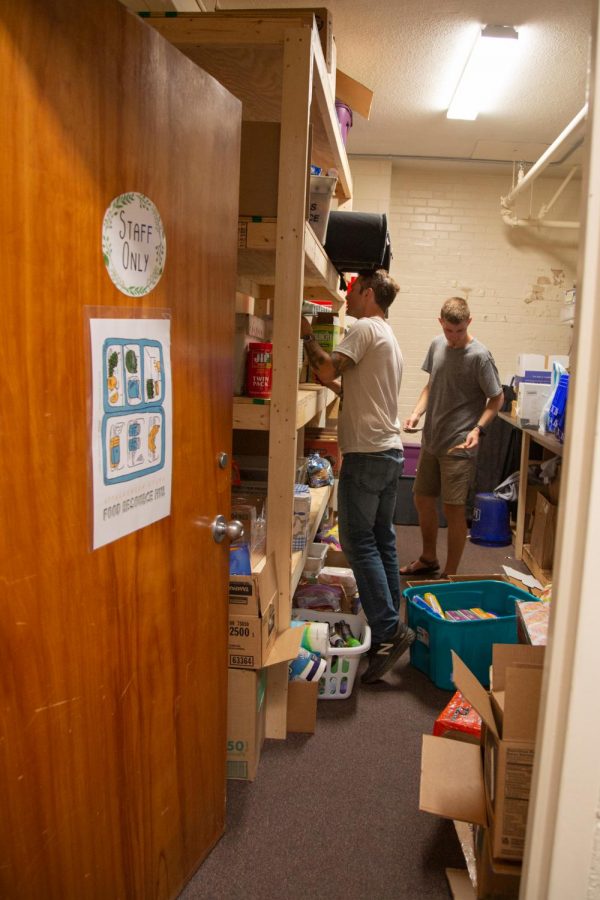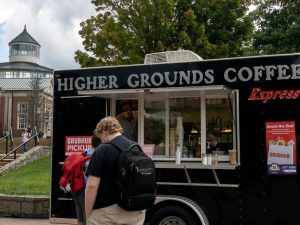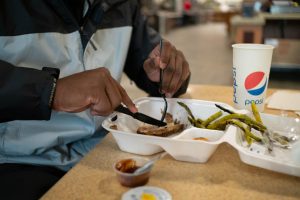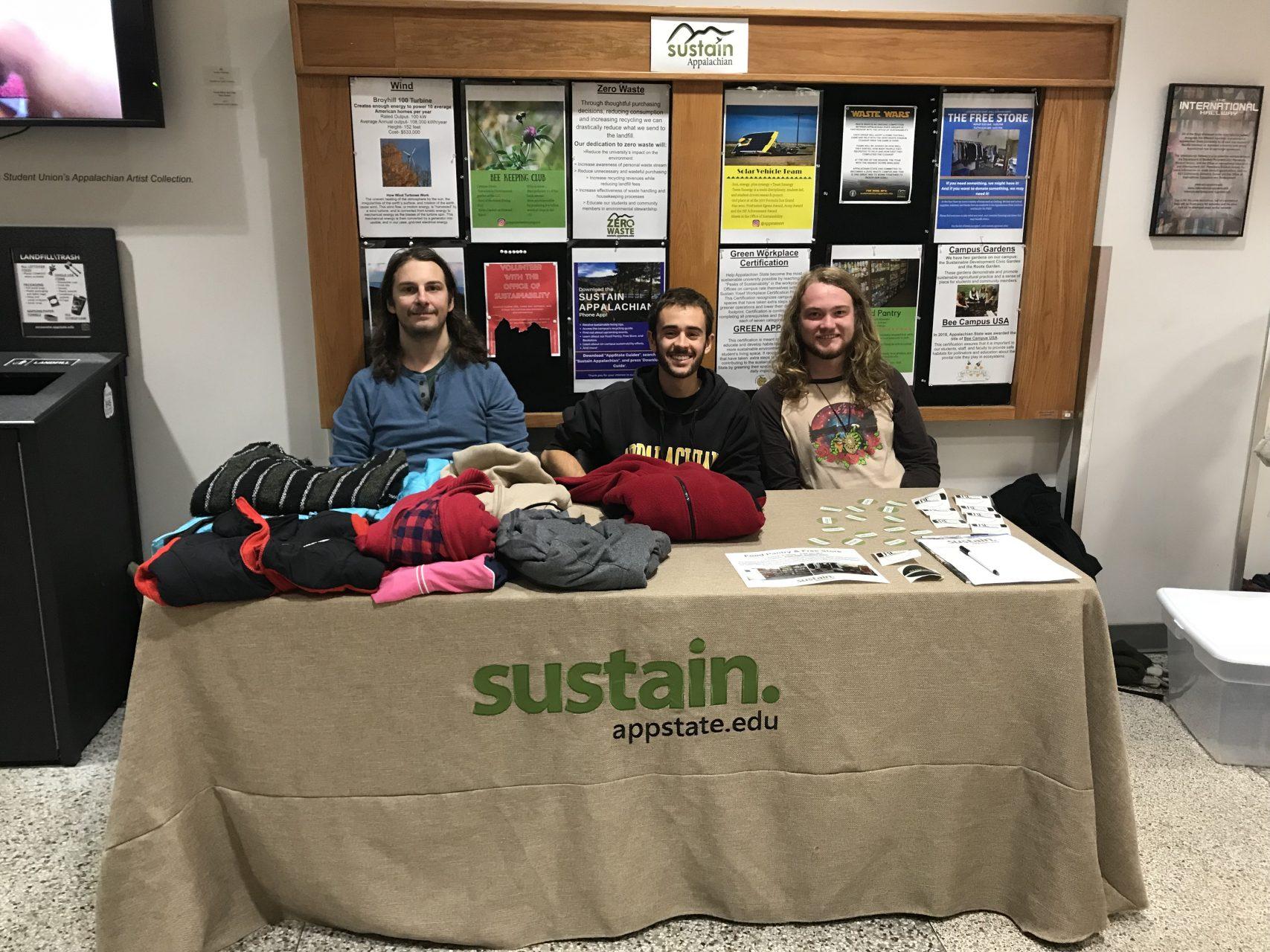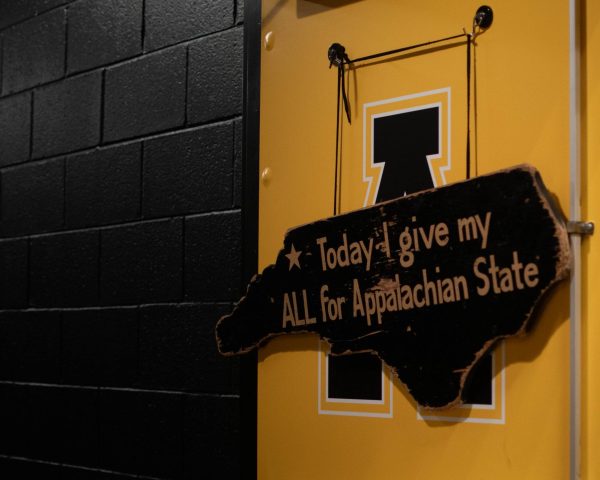App State tackles food insecurity through free pantries, adjustments made for COVID-19
Volunteers stock the pantry at the Food Resource Hub in 2019. App State has spaces across campus where students and faculty can get a variety of items including food for free to eliminate food insecurity, a problem that has been exacerbated by the pandemic.
October 3, 2020
As students balance their lives in the middle of a global pandemic, many are left without resources to feed themselves and are forced to choose between their scholarly, personal responsibilities and food.
“There’s a lot more food insecurity than you would realize,” said Jennifer Maxwell, sustainability program manager for the Office of Sustainability.
Food insecurity is the state of being without quality and affordable food. A study from The Hope Center in 2018 found that 45% of 86,000 college students surveyed were food insecure in the previous 30 days.
“Those numbers, for us, were pretty staggering and really brought this situation to light,” Maxwell said.
Rebbeca Walton, outreach coordinator for OOS, said many students simply don’t have the time to work while being a full-time student. Sometimes, she said, students choose between school and eating.
Devin Mullins, SGA director of sustainable development, said the problem goes beyond just students.
“I am also concerned about Boone locals, the people who are affected by this but didn’t ask for students to come here,” Mullins said.
In Watauga County, 30% of residents are food insecure and lack access to assistance, according to the Watauga Food Council.
App State has food pantries across campus where students and faculty can get a variety of items including food, clothing and personal care items for free. Pantries can be found in the Office of Sustainability, Belk Library, Garwood Hall, D.D. Dougherty Building and Reich College of Education.
App State’s main pantry, the Mountaineer Food Hub, located in the Office of Sustainability below East Hall, is open 9 a.m. to 4:30 p.m. Monday through Friday. Established in 2016, this pantry works alongside the others to provide resources and ensure each one is sufficiently stocked.
As a precaution during the pandemic, the Mountaineer Food Hub is offering bags of “staple foods” containing pasta, sauce, beans, rice, mac and cheese, soup, tuna, peanut butter, granola bars and oatmeal. They also offer bags of canned veggies and “breakfast bags” with cereal, shelf-stable milk, oatmeal, grits and granola bars. When available, the office adds fresh produce to bags.
In an effort to have more food available, Mullins said SGA is pushing to implement a system that would allow students to pay off parking tickets by donating food, a rendition of Georgia Southern’s Food for Fines program, but nothing has been put into practice yet.
“We have a parking problem in Boone, and we have a food insecurity issue in Boone,” Mullins said. “Under the right circumstances, (students) could donate a certain amount of food and have their parking ticket voided.”
The office also offers personal care items including shampoo, conditioner, soap, toothbrushes, toothpaste, shaving supplies and menstrual products.
If someone needs specific items or a custom bag, Maxwell says her office is happy to do it because they’re only offering pre-made bags right now, and do not allow students to freely shop the shelves.
Since COVID-19 hit in March, the Mountaineer Food Hub has given away 420 shares of food to community members and received 46 donations. The Office of Sustainability is working with COVID-19 case managers in the event students in quarantine need food delivered.
All food comes from donations, food drives, and ingredients grown in campus gardens and the Sustainable Development Teaching and Research Farm in Ashe County.
Bonnie Allen, a junior sustainable development major who worked on the App State farm, says she noticed the amount of leftover crops dining didn’t receive due to their appearance and connected with the office so they could put it to use. Now, the App State farm sends a portion of its crop to Campus Dining.
“There’s absolutely nothing wrong with the vegetables that markets and restaurants don’t want to take,” Allen said. “They might (have) a few bumps on them or a weird spot, but they are still totally edible and taste equally delicious. It’s a total waste to let all of it rot on the plant because more often than not, nature doesn’t make perfect fruits and veggies.”
Those who need assistance can reach out to the Office of Sustainability. Mullins encourages students to talk to SGA about their needs, and said President Michael Davis is devoted to battling food insecurity.
Davis, a senior, established the Mountaineer Mealshare Program as a freshman and by coordinating a dunk tank fundraiser as a junior to raise money for campus food pantries.
The Watauga Food Council also has additional resources on their website.
Pantry Hours:
- The Office of Sustainability
- Monday through Friday 9 a.m. to 4:30 p.m.
- Belk Library
- Sunday 2 p.m. to 11 p.m., Monday through Thursday 7:30 a.m. to 11 p.m., Friday 7:30 a.m. to 9 p.m., Closed Saturday
- Garwood Hall
- Open when staff are in the building
- D.D. Dougherty
- Open when staff are in the building
- Reich College of Education (closed for fall 2020 semester)

